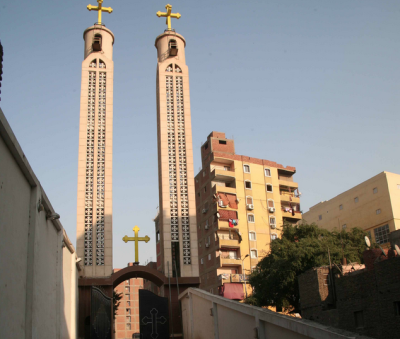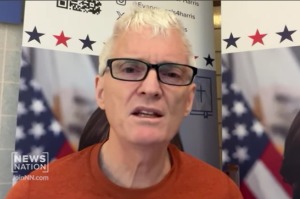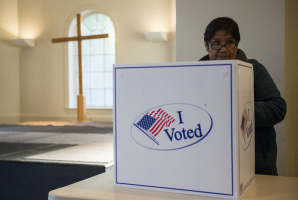Traumatized Survivors of Wedding Attack in Egypt Look to God
The wounded mother of a 12-year-old girl killed at a church wedding on Oct. 20 in suburban Cairo lay in a hospital bed on Thursday (Oct. 24), lost in anguish.
Howida Refaat Azer, 30, had spent days slipping in and out of consciousness following operations on her right leg, and that afternoon her family finally gained the courage to tell her that her daughter, Mariam Nabil Fahmy Azer, had been shot dead in an attack that killed three other wedding guests. Hours later, Azer was shifting back and forth between numbness and agony as five women encircling her bed tried and failed to console her.

During a period of calm, she stared ahead, expressionless and void, then suddenly lifted her head off her pillow, looked at the ceiling and cried out the name of her daughter.
"Mariam! Oh, God – why did You take her from me? Why did You give me two daughters and then take one from me?" she cried, and then mumbled as she collapsed back into the sheets, "Thank you, God. Please forgive me, God. I can't take any more of this."
Azer's daughter was one of two girls killed in the drive-by, machine-gun attack on Coptic Christians that were filing into the Church of the Holy Virgin and the Archangel Michael in Giza, in the Al-Warraq area of greater Cairo, for a wedding that had yet to take place. The other child killed, 8-year-old Mariam Ashraf Mesiha, was the 12-year-old's cousin. The attack came amid weeks of anti-Christian violence by supporters of ousted president Mohamed Morsi; Muslim Brotherhood members and other supporters blame Christians for his downfall.
Camilia Helmy Attyia, 62, the mother of the groom, died on the pavement outside the church. Samir Fahmy Azer, 46, died on the way to the hospital or immediately after arriving there, as did the girls, according to family members; he was the brother of Howida Azer's husband.
Hours after two men on a motorcycle sprayed the waiting crowd outside the church building with bullets, the couple was married very late that night, dressed in mourning black, the groom's brother told Morning Star News. Three people attended the ceremony.
Four days later, when relatives told Howida Azer that her daughter had been killed, she was devastated but said she had suspected as much because of a recurring dream she'd had in her hospital bed. Several times, Azer told relatives, she had dreamt that her 12-year-old, dressed in white in the after-life, had told her not to worry about her, that she was okay.
Faith of the Afflicted
At the Armed Forces Hospital in Maadi, the fifth floor is full with members of the bride's family. Like Azer, they believe they have no option but to turn to God.
As brutal as the loss has been to Howida Azer, a relative of the bride, members of her family still cannot bring themselves to tell her husband, Nabil Fahmy Azer, 40, about the death of his daughter.
Since learning about the killing of his brother and his niece, Nabil Azer has been unable to speak. He is still recovering from his wounds, and his family fears that learning about the loss of his daughter could lead to death or push him into insanity. Because of the near-constant presence of his daughter's image in news media around the country, no magazines or newspapers are allowed near him, and any television sets, radios or Internet sources around him remain silent.
How his faith confronts the trauma he's suffered remains to be seen, while the faith of others is more apparent. Most of those injured in the ward are men, with bullet wounds to their legs. One critical exception was Ashraf Ayad Attyia, 33, who was shot through the neck. Miraculously, the bullet passed completely through without severing his larynx, arteries or spinal column.
Even though he was still in pain on Thursday, he smiled and admitted he realized how lucky he was to be alive.
"I thank God for sparing my life," Attyia said.
Awad Botros Khalil, 40, a self-professed "nominal Christian," said the shooting convicted him of his lack of faith. He was hit in his right leg. The bullet went in and severed three veins just above his foot, which he now cannot move. In a country where attending church services can mean death, he said he needed to "step up" to what he is supposed to be spiritually.
"When I was shot, almost dying and seeing the love of God and people around me, I know now I need to get close to God," Khalil said.
His comments were echoed by many others in the recovery ward.
Among the wounded were two children who were at the Coptic Orthodox church. Marina Maged George, 13, has a bullet wound to her arm, and Felobateer Ashraf, 7, remains in serious condition with a bullet wound to his stomach.
Most of those injured said they couldn't remember being shot or even seeing the shooters, but others said they saw the assailants on the motorcycle, their heads wrapped in scarves to hide their identity. From the motorcycle, one of the shooters emptied one clip of ammunition from his rifle, reloaded another clip and emptied it into the crowd. An accomplice in a car had blocked traffic from entering the street to enable escape, and the car and the motorcycle then sped off into traffic.
Members of the Azer family said they feel like Copts in Egypt are being attacked as a people, but that the assaults make their faith stronger.
A priest at the church, the Rev. Sawaris Boushra, was in the church library when the shooting started. The attack has had a significant effect on Christians in the area, he said, with many feeling like they are "under siege." Boushra said the Oct. 20 attack, previous assaults and ones to come are to be "expected."
"Christianity is based on persecution," he said. "Christ said there would come a time when people will kill Christians and think they are doing God's will. That is happening now."
Days after the attack, church officials accused police officers of not posting guards at the site, a standard practice throughout Egypt for years because of the constant threat of violence against churches. There have been reports that security guards were either not present during the event or that they had left prior to the attack.
Many are doubtful as to whether more adequate security could have prevented or limited the effects of the shooting but are calling for an investigation into whether there was failure or negligence on the part of security forces.
According to one unconfirmed report, five men were arrested on Oct. 21 in connection with the shooting.
The Attack
At around 8 p.m. that night, according to witnesses, the accomplice's car blocked off the street in front of the church building while the two men on the motorcycle drove up to the entrance and sprayed the crowd outside with gunfire from at least one automatic rifle.
Besides the four Christians killed, 17 people were injured, including two Muslim men and one Muslim boy. Additionally, two children have been reported missing, according to the Coptic newspaper, Watani Weekly.
Almost all of those killed or injured, with the exception of the three Muslim men, were members of the families of the bride or the groom. On Thursday night, Mohammed Ibrahim Mahmoud, 17, one of the Muslim bystanders injured during the attack, died in the hospital.
As with several other anonymous attacks in recent months targeting Coptic Christians, including the Aug. 6 shooting death of 10-year-old Jessica Boulous, no one has claimed responsibility for the killings, and no arrests have been made.
Two days after the shooting, victims of the attack who were recovering in various hospitals in Cairo were all taken to the military hospital by order of the national government. Military hospitals are known throughout Egypt as having a better standard of care than the average, crowded, poorly staffed and poorly funded public hospitals serving most Egyptians.
The wedding attack was the latest in a series of assaults against the Coptic Christian community since the ouster of Morsi in July. After the military broke up pro-Morsi protest camps on August 14, Islamists attacked close to 60 churches and dozens of Christian-owned businesses across Egypt. When the large-scale attacks died down, sporadic, seemingly random attacks began.
On July 6, Mina Aboud Sharween (previously identified as Sharubim), a Coptic priest, was gunned down in El Arish in North Sinai. Days later the decapitated body of Christian businessman Magdy Lamei was found in the town of Sheikh Zuwayed, also in North Sinai. The sporadic attacks continued with the shooting death of Boulous and a Sept. 30 assassination attempt on Bishop Anba Makarios of Minya.
These came on top of almost weekly reports of Copts being kidnapped across Egypt. The kidnappings are carried out in hopes of collecting ransom money, but the disproportionate number of Copts kidnapped seems to indicate anti-Christian motives.
Over the summer, Islamists gradually took over the town of Delga in Central Egypt, threatening and harassing Christians daily and forcing them to pay a form of Jizya tax. On Sept. 16, the government finally intervened; the army attacked the town, seized it from the Islamists and, after days of fighting, generally restored order.




























